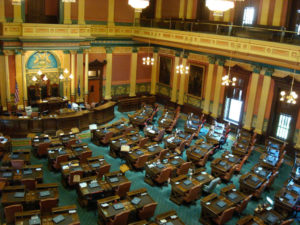House committee advances key bills on minimum wage and Earned Sick Time Act
 Two bills to revise the state’s minimum wage and Earned Sick Time Act (ESTA) advanced out of a House select committee this week.
Two bills to revise the state’s minimum wage and Earned Sick Time Act (ESTA) advanced out of a House select committee this week.
House Bills 4001 and 4002, by Rep. John Roth (R-Grand Traverse) and Rep. Jay DeBoyer (R-St. Clair), are top priorities for House Republicans, who reclaimed the majority this legislative session.
The committee heard testimony on the bills in two separate hearings before voting to send them to the House floor.
HB 4001 amends Michigan’s minimum wage law to adjust to wage rates while maintaining the restaurant tip credit. Under this system, restaurant servers will continue to rely on tips to supplement their base pay, a move that has sparked debate among workers’ advocacy groups and business organizations. Proponents argue the bill preserves an industry standard that protects small businesses from additional costs, and servers who testified believe their tips allow for higher income than the minimum wage would.
For all other employers, the minimum wage would increase on Feb. 21 to $12 per hour and go up 50 cent per year on Jan. 1 of each year through 2029 and then be tied to the Consumer Price Index average annual percentage change for the most recent 5-year period. MAC supports HB 4001.
HB 4002, which seeks to amend the Earned Sick Time Act set to take effect on Feb. 21, introduces a range of changes aimed at balancing employee rights and employer flexibility. MAC supports the changes proposed in HB 4002. Key provisions include:
- Businesses with fewer than 50 employees would be exempt from the law.
- The bill defines eligible employees, exempting independent contractors, out-of-state employees, seasonal workers (25 weeks or fewer), part-time workers (25 hours or less per week) and variable-hour employees.
- Employers would have two compliance pathways:
- Provide up to 72 hours of sick time at the start of the year, with no carryover requirements.
- Have employees earn one hour of sick time for every 30 hours worked, with a cap of 72 hours annually. Carryover is limited to 72 hours unless the employer agrees to more and employers may opt to pay out unused time at year-end to avoid carryover.
- Employers may integrate sick time tracking with existing payroll systems and meet compliance by offering time through a general PTO bank.
- The bill specifies that sick time compensation excludes bonuses, tips, commissions, overtime pay, and holiday pay.
- Employers can establish customary notice, documentation requirements and disciplinary actions for noncompliance with policies.
- Earned sick time can run concurrently with federal Family Medical Leave Act or Americans with Disabilities Act leave, and employees would have 15 days to provide necessary documentation.
- Employers can pay out accrued sick time upon separation to avoid reinstatement obligations if the employee returns.
Advocates argue these bills strike a balance between supporting Michigan’s workforce and protecting small businesses from regulatory overreach. The Senate versions of these bills are markedly different than the House version, though no hearings or movement have been held on those bills.
As HBs 4001-02 head to the House floor, all eyes will be on whether bipartisan consensus can be reached on these high-stakes issues. For more information on this issue, contact Deena Bosworth at bosworth@micounties.org.
Republican road funding plan raises revenue sharing concerns
 Gov. Gretchen Whitmer called on legislators during her public address this week to find a sustainable, long-term funding solution to the persistent road funding dilemma. In response, House Speaker Matt Hall (R-Kalamazoo) provided this week an updated and more detailed plan than he initially released late in 2024.
Gov. Gretchen Whitmer called on legislators during her public address this week to find a sustainable, long-term funding solution to the persistent road funding dilemma. In response, House Speaker Matt Hall (R-Kalamazoo) provided this week an updated and more detailed plan than he initially released late in 2024.
Speaker Hall intends to focus on local roads and increase road funding without raising taxes. The republican road funding plan would shift all state tax revenue at the pump towards roads, rather than the current split between fuel tax and sales tax.
While MAC is supportive of House Republicans’ focus on local roads, it is imperative that sales tax revenue not be reduced, even if redirected towards road funding. Counties, schools and other local units of government rely heavily on revenue from the state sales tax. The proposed road funding initiative will decrease sales tax revenue and, therefore, revenue sharing.
MAC will work alongside legislators to ensure the future of road funding focuses on local roads AND that counties are made whole, should the sales tax revenue from the gas pump be redirected to roads.
For more information on this issue, contact Deena Bosworth at bosworth@micounties.org.
MAC: Counties look forward to working with Gov. Whitmer to protect investments in local resources, services
 Michigan’s county government leaders commended Gov. Gretchen Whitmer’s emphasis on investing in local public assets and services in her “Road Ahead” address at the Detroit Auto Show this week.
Michigan’s county government leaders commended Gov. Gretchen Whitmer’s emphasis on investing in local public assets and services in her “Road Ahead” address at the Detroit Auto Show this week.
“What an excellent start to the new year to hear the governor speak about the central role that local public services play in the life of Michiganders,” said Stephan Currie, MAC executive director.
“While the speech included discussion on Michigan’s road network, it’s clear that she sees the principle applying across all aspects of Michigan communities, from housing and place-making to the re-use of brownfield sites to spur job creation and our economy,” Currie added. “As Michigan’s original regional governments, our counties are uniquely placed and well-equipped to spearhead such work.”
To that end, MAC’s policy efforts will again center on fundamental reform of Michigan’s revenue sharing system with local governments, part of a system that the nonpartisan Citizens Research Council of Michigan has deemed “unsustainable” for local public services.
This reform would be a dedicated revenue sharing fund, separated from the annual budget politics in Lansing, which is essential to meeting the promise made decades ago by the state to properly share revenue so county leaders can do their jobs.
Citizens wondering about local resources should note that 25 years ago, the state allocated $228 million to counties via revenue sharing. Had the state simply adjusted that figure for inflation each year, counties would have received nearly $404 million this year, which would be invested in local communities for public safety, public health, roads or a variety of areas which make our communities more attractive.
“The governor’s remarks are a sign of hope that real progress can be made this year in Lansing. Our members are excited to partner with state leaders to turn remarks into reality,” Currie said.
Treasury releases taxable value data as part of revenue sharing process
 The Michigan Department of Treasury announced this week it will send taxable value reports for May 2024 to cities, villages and townships across the state. These reports, derived from county equalization data submitted in May 2024, will serve as a critical step in verifying the taxable values reported by local governments.
The Michigan Department of Treasury announced this week it will send taxable value reports for May 2024 to cities, villages and townships across the state. These reports, derived from county equalization data submitted in May 2024, will serve as a critical step in verifying the taxable values reported by local governments.
The accuracy of these figures is especially significant because they affect the calculation of revenue sharing payments for FY 2025. Revenue sharing payments to counties will be based on ongoing funding levels established in FY 2024, totaling $261 million, plus an additional $30 million. This additional $30 million will be distributed to each county using an inverse relationship formula, prioritizing counties with lower total taxable values compared to the rest of the state. All counties in the state will see an increase. Click here for estimated payments to each county this year.
To ensure payments are calculated accurately, it is essential that local taxable value data align with the figures submitted by county equalization departments. Locals have until Feb. 7 to review and contest the reported taxable values if discrepancies are identified. To dispute the figures, local units must complete and submit Form 6167 to the Department of Treasury, their county Equalization department and the county treasurer.
While Treasury does not anticipate widespread disputes, any discrepancies will be addressed in coordination with the relevant equalization department.
For additional guidance on the taxable value verification process or assistance with Form 6167, contact the Michigan Department of Treasury at TreasRevenueSharing@michigan.gov. For additional questions, contact Deena Bosworth at bosworth@micounties.org.
Call governor in support of medical ground transport bill
 County leaders are encouraged to contact Gov. Gretchen Whitmer’s office (517-335-7858) in support of her signing House Bill 5695.
County leaders are encouraged to contact Gov. Gretchen Whitmer’s office (517-335-7858) in support of her signing House Bill 5695.
HB 5695, by Rep. Mike McFall (D-Oakland), requires the Michigan Department of Health and Human Services (MDHHS) to participate in the federal GEMT reimbursement program. MAC supports HB 5695. It cleared the Legislature in 2024 on a bipartisan basis.
But if Whitmer does not sign the bill by Jan. 22, it will not become law.
The U.S. Centers for Medicare and Medicaid Services (CMS) oversees the Ground Emergency Medical Transportation (GEMT) program. GEMT provides funding and support to eligible health care providers through state agencies, aiming to ensure that individuals without reliable transportation can access emergency medical care. This program improves access to emergency services for Medicaid beneficiaries, bridging the gap between patients and health care facilities and facilitating timely care during emergencies.
While Michigan doesn’t currently participate in the program, our state has the eighth-highest number of Medicaid enrollees in the nation. Local emergency services and ambulance providers are not fully reimbursed by Medicaid to cover the costs of medical transportation for this significant segment of our communities. The GEMT initiative in Michigan seeks to address health disparities, promote health equity, and reimburse local agencies and emergency services providers for serving vulnerable populations.
A $500,000 appropriation was secured in the FY25 state budget to assist MDHHS in starting up GEMT in Michigan.
EGLE launches Materials Management Planning grant program
 The Michigan Department of Environment, Great Lakes, and Energy (EGLE) has officially announced the availability of grants to assist counties in preparing, implementing, and maintaining Materials Management Plans (MMPs). This funding aims to help local governments meet new planning requirements to improve the management and recycling of materials in their communities.
The Michigan Department of Environment, Great Lakes, and Energy (EGLE) has officially announced the availability of grants to assist counties in preparing, implementing, and maintaining Materials Management Plans (MMPs). This funding aims to help local governments meet new planning requirements to improve the management and recycling of materials in their communities.
Per the enabling statute, the grant amounts are calculated based on the following formula:
- $60,000 per county in the planning area
- An additional $10,000 per county if the planning area includes more than one county
- 50 cents per resident in the planning area, up to a population of 600,000 residents
Counties or planning areas with more than one county will receive an augmented funding allocation to accommodate their broader needs.
However, it is important to note that these are reimbursable grants, meaning counties must first incur the costs and then submit for reimbursement, rather than receiving funds upfront.
MAC has raised concerns about the grant program’s implementation. While the statutory language clearly outlines the total funding obligated to each county or planning area, there is a risk that some counties may not receive their full allocation. To address this, MAC will advocate for modifications to ensure every eligible county complying with the program receives the maximum disbursement allowed under law.
For complete grant details, visit EGLE’s official webpage. For program questions, contact EGLE’s Christina Miller at millerc1@michigan.gov.
For further information or support on this issue, counties can contact MAC’s Deena Bosworth at bosworth@micounties.org
Podcast 83: House sets nontraditional course in early 2025
 Traditions are being broken right and left at the State Capitol in 2025 and it’s unclear how counties will fare from the results, MAC’s Podcast 83 Team reports in its newest episode.
Traditions are being broken right and left at the State Capitol in 2025 and it’s unclear how counties will fare from the results, MAC’s Podcast 83 Team reports in its newest episode.
“In the incoming term, there will not be a house Local Government Committee, which is something to my understanding that hasn’t been done before,” explained Samantha Gibson. “Typically, most of our issues do go through the house Local Government Committee. Obviously, you know, we spend a lot of time in judiciary and criminal justice and transportation and whatnot, but the house Local Government Committee has been a long-standing platform for local governments to use in the House, so it’ll be different this term kind of running around all over the place to all these different committees.”
“I’m more than a little bit concerned,” added Deena Bosworth. “There are several issues that always went through the Local Government Committee that don’t really belong in some of the other policy committees. If you take issues like Open Meetings Act or zoning issues, local control issues are important. And we’ve seen Local Government Committee members who usually have local government background, and they understand the plight that local governments go through.”
New House Speaker Matt Hall (R-Kalamazoo) also has charted a new path on approved legislation from 2024, so far refusing to send over bills for Gov. Gretchen Whitmer’s signature to make them law. Among the stalled measures is House Bill 6058, which alters what counties have to do on employee health insurance.
“We were not happy with how it was drafted, how it went through the process and how it ultimately ended up,” Bosworth said. “The problem is that it doesn’t really make a whole lot of sense.
“I guess we’ll wait and see on that,” Bosworth added. “See what the new speaker does with those bills, if he’s compelled to, at some point, present them to the governor, and we’ll see what the governor does, right? Like I said, I’ve never seen this before, but it’s fun to watch a lot of things we haven’t seen before.”
To view the full episode, recorded on Jan. 13, click here.
Previous episodes can be seen at MAC’s YouTube Channel.
And you always can find details about Podcast 83 on the MAC website.
Public comment period for Material Utilization Facilities draft closes Jan. 31
 The Michigan Department of Environment, Great Lakes and Energy (EGLE) is still accepting public comment through Jan. 31 on the draft General Permit for Materials Utilization Facilities. Materials utilization facilities include composting facilities, materials recovery facilities, anaerobic digesters and innovative technology facilities.
The Michigan Department of Environment, Great Lakes and Energy (EGLE) is still accepting public comment through Jan. 31 on the draft General Permit for Materials Utilization Facilities. Materials utilization facilities include composting facilities, materials recovery facilities, anaerobic digesters and innovative technology facilities.
Submit comments on the draft General Permit for Materials Utilization Facilities via email to EGLE-MMD-SW@Michigan.gov.
Michigan’s solid waste law, Part 115, Solid Waste Management, of the Natural Resources and Environmental Protection Act, 1994 PA 451, as amended (Part 115), was amended in December 2022. Under the amended law, materials management facilities may be required to notify EGLE of their operation or obtain a registration or general permit. The type of authorization required is dependent on the type of activity, and/or the volume of material handled on-site.
Please visit the Materials Management Facilities Webpage for additional information on determining what type of authorization is required for a specific facility. Facilities subject to the general permit are required to apply by March 29, 2025.
For questions about the general permits required under Michigan’s solid waste law, email EGLE-MMD-SW@Michigan.gov or call Sueann Murphy at 517-899-5594. The General Permit for Materials Utilization Facilities and its contents are subject to the Freedom of Information Act and may be released to the public.
 MAC offices closed on Monday, Jan. 20
MAC offices closed on Monday, Jan. 20
MAC’s offices in downtown Lansing will be closed on Monday, Jan. 20 to observe the Martin Luther King, Jr. Holiday.
Offices will return to normal operating hours on Tuesday, Jan. 21 at 8 a.m.
See a video of Dr. King’s famous “I Have a Dream” speech from the steps of the Lincoln Memorial on Aug. 28, 1963.
Renewable energy briefing set for Jan. 29 in Gaylord
 The Department of Environment, Great Lakes and Energy (EGLE) and the Renewable Energy Academy (REA) are hosting a workshop on Jan. 29 in Gaylord to provide local officials, planning commissioners and/or planning staff with the information needed to prepare for the new siting landscape that came into effect Nov. 29, 2024.
The Department of Environment, Great Lakes and Energy (EGLE) and the Renewable Energy Academy (REA) are hosting a workshop on Jan. 29 in Gaylord to provide local officials, planning commissioners and/or planning staff with the information needed to prepare for the new siting landscape that came into effect Nov. 29, 2024.
The four-hour workshop will be a deep dive into planning and zoning for large, utility-scale solar, wind and battery storage systems, from the basics of grid-connection to the specific zoning pathways each community should consider.
This workshop will not be focusing on policy; rather it is meant to provide neutral guidance and spark discussions around what options best reflect your municipality’s interests. The workshop is free.
Agenda
The REA runs from 10 a.m. to 2 p.m. and is immediately followed by an optional “office hour” session with EGLE staff. Lunch is complimentary and REA topics that will be covered include:
- Basics of renewable energy.
- Planning and zoning for renewable energy technologies.
- Public Act 233 of 2023, zoning pathways and “workability” options.
- Guided activities.
- Guest speaker insights from the University of Michigan, Center for EmPowering Communities.
- Question and answers throughout.
Register now to join us Jan. 29, 2025, in the Northeast Council of Governments
(NEMCOG) Region at Treetops Resort in Gaylord. A maximum of 4 attendees per community are allowed and one representative per community must register all planned attendees using one registration form.
Check out the Renewables Ready Communities Award webpage to find funding options for expanding large, utility-scale solar, wind, and battery storage systems in Michigan.
Program or registration questions: Zona Martin, MartinZ2@Michigan.gov or 517-930-4697; Ian O’Leary, OLearyI@Michigan.gov or 517-930-4611.
 Staff picks
Staff picks
- Jackson County to save thousands through $1 landfill purchase (MLive)
- Who funds Michigan lawmakers? Most get cash from PACs, not voters they represent (Bridge Michigan)
- One way Trump could revive rural America (Governing)
- Feds offer help complying with website accessibility rule (RouteFifty)
